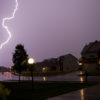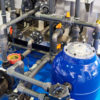There are many things that can affect the chemistry of your swimming pool, including your dog, rain, pool parties, sunshine and wind and more. You need not worry, as long as you are testing the water often. Pool Troopers would like you to know what offenders are waiting in the wings to throw your water balance off. Because the water chemistry is important to your family’s health as well as the condition of your pool, it is wise to be aware some of these issues.
1. Your family and your dog
There’s a whole list of things that your family members and their friends can bring into your pool water that will have an effect on its chemistry. These include:
- Sunscreens
- Lotions
- Perfumes
A swim by Rover and the bacteria carried by swimmers add to this effect on your pool water chemistry. A pool party, with lots of hair products, lotions or perfumes can wreak havoc on the chemistry of your pool.
Solution: Taking a shower before the pool is entered is one way of minimizing this problem. Showering reduces the level on contaminants that are added to the pool.
2. Where the source water comes from
The source of the water that fills your pool may have high levels of organic compounds, metals, minerals and added chemicals that can affect the water and its chemistry.
Solution: When new water is added to the pool, be sure to test its chemistry and make any necessary adjustments to pH, alkalinity, and sanitizer before going for a swim.
3. A rain shower
When the drops fall from the sky, your pool pH is affected. Rainwater can be acidic, and therefore can affect the pH of the pool if there is a lot of rain. If left unchecked and not rebalanced, the acidity from the rainwater will lower your pool’s pH. pH below 7.0 ppm is considered corrosive and for prolonged periods could cause surface as well as equipment damage.
Solution: After a rainfall, test your pool’s pH level and treat it if necessary.
4. No circulation of water
Pool water needs to be circulated or algae and bacteria will grow and thrive in it, affecting the water chemistry. Because stagnant water attracts the growth of bacteria, be sure that the water is circulated adequately. Your pools filtration and circulation system works hand in hand. The pool turnover rate during swim season should be a minimum of 2. The time it takes your pool pump to move 100% of your pool’s volume through the filter equals one turnover.
Stagnant water is also a great breeding ground for mosquitoes, so besides affecting its chemistry, it can affect the health of your family. Remember a non-circulating pool is….a pond.
5. Pool chemicals
The primary function of pool water chemical balance is to provide a swim safe, pleasing environment for swimmers. A secondary purpose of pool water balance is to protect the pool itself and the pool equipment.
Pool Chemistry should be checked after any large rain event or heavy usage of the pool, in addition to a routine set amount of time, usually weekly and no less frequently than every other week.
Decide on your primary sanitizer and understand that chlorinating compounds will have an effect on your pool’s pH. Pool Bleach (Sodium Hypochlorite), for example, has a very high pH and therefore the pool pH needs to be adjusted down with Pool Acid (Muriatic Acid) to counteract the pH rise associated with the bleach. Some chlorinating compounds have a lowering effect on pH, so if you use those as your primary sanitizer you will need to buffer up your pools pH after each use of your sanitizer. Understand the chemicals you use and their relation on your pools pH and alkalinity.
You will also need to adjust your pools Hardness, Alkalinity, Stabilizer, Phosphate remover, and perhaps metal sequestering levels.
6. Phosphates in the pool
Phosphates promote the growth of algae, the green gunk in the pool, as chlorine is consumed as it tries to fight the algae. Without enough chlorine, your pool cannot be sanitized properly.
Learning more about algae can help you keep on top of this; its reproduction depends on several things, one of them being phosphates:
- Air
- Water
- Sunshine
- Nitrates
- Phosphates
Phosphates can often be introduced into the water through fertilizers for lawn and garden, vegetation that is decaying or municipal water.
Solution: The target threshold for phosphates in the pool is 50 parts per billion. Test your water frequently and have regular pool maintenance. Remove leaves and organic materials from water as soon as you spot it. If needed use a phosphate removing chemical on your pool by following its label usage strictly. Overuse of any pool chemical is not a good thing.
7. Ultraviolet light and sunshine
You love the sunshine when thinking of swimming in a pool; however, it can have a negative effect on the water in your pool. Evaporation, as well as loss of chlorine, are two results of the sun shining on your pool. Other chemicals can be affected as well with the UV light that is emitted from sunlight having an effect on them.
Solution: Cyanuric acid helps shield the water from damage and degradation by the sun’s UV light. Just be sure that the correct amount is added.
8. Wind
The wind carries a plethora of unwanted debris that can land in your water. Toys and other unwanted dirt, debris and algae can be carried into the pool on windy days.
Solution: Keep the pool cleaned up after storms and remove loose lawn debris from areas around pools.
9. Heat
Water temperatures that are consistently higher than 90 degrees can allow bacteria to thrive and grow as well as cause scale formation. Chlorine also loses effectiveness in higher temperature water. More sanitizer will be needed.
Solution: Monitor and test the water frequently if the pool is heated.
10. Dirt and debris
A variety of debris can end up in your pool and affect its water chemistry. From leaves to hair to organic debris, such as sweat, dead skin cells, suntan lotions, oils, cosmetics, hair products and more can have a negative effect on the chemistry of your water. Dead plants and insects often find their way into your lovely pool as well.
Solution: Skim the pool with regularity. If the pool is not used very often, make sure it is cleaned and balanced before every use.
Avoiding or correcting the above issues can create a safer and cleaner pool. If your time is limited for maintaining the chemistry of your pool, you can turn to us for assistance. Now you know what can negatively impact your pool; it may be right to call on us if you need help with your pool environment.
Pool Troopers can help you with the improvement of your pool’s water chemistry with timely maintenance service. We have three different levels of care which include weekly service as well as the use of the Free use of our Salt Chlorine System. We can assure that your swimming pool has the right balance of chemicals that will make it safe for swimming for your family and friends.
Pool Troopers does routine testing of the water, so you do not need to buy and transport or store chemicals when adjustments are needed. All of our Pool Troopers Chemical Service options includes all the chemicals and testing to achieve the perfect chemistry of your pool, making it blue and clear for your family, friends and pets. The pool cleaning services that we offer can include cleaning of the baskets and filter as well as wall brushing at an affordable cost. Some homeowners may want to clean their pool but do not enjoy cleaning the filter; we have a service for that, as well as full pool cleaning too!
Find out more about how Pool Troopers has your back when it comes to the chemistry of the water in your pool. Enjoy the Pool Troopers difference that gives clients freedom to enjoy life while knowing that their family will be swimming in a blue and swim-safe pool. Find your location and give us a call to schedule contract-free service.




